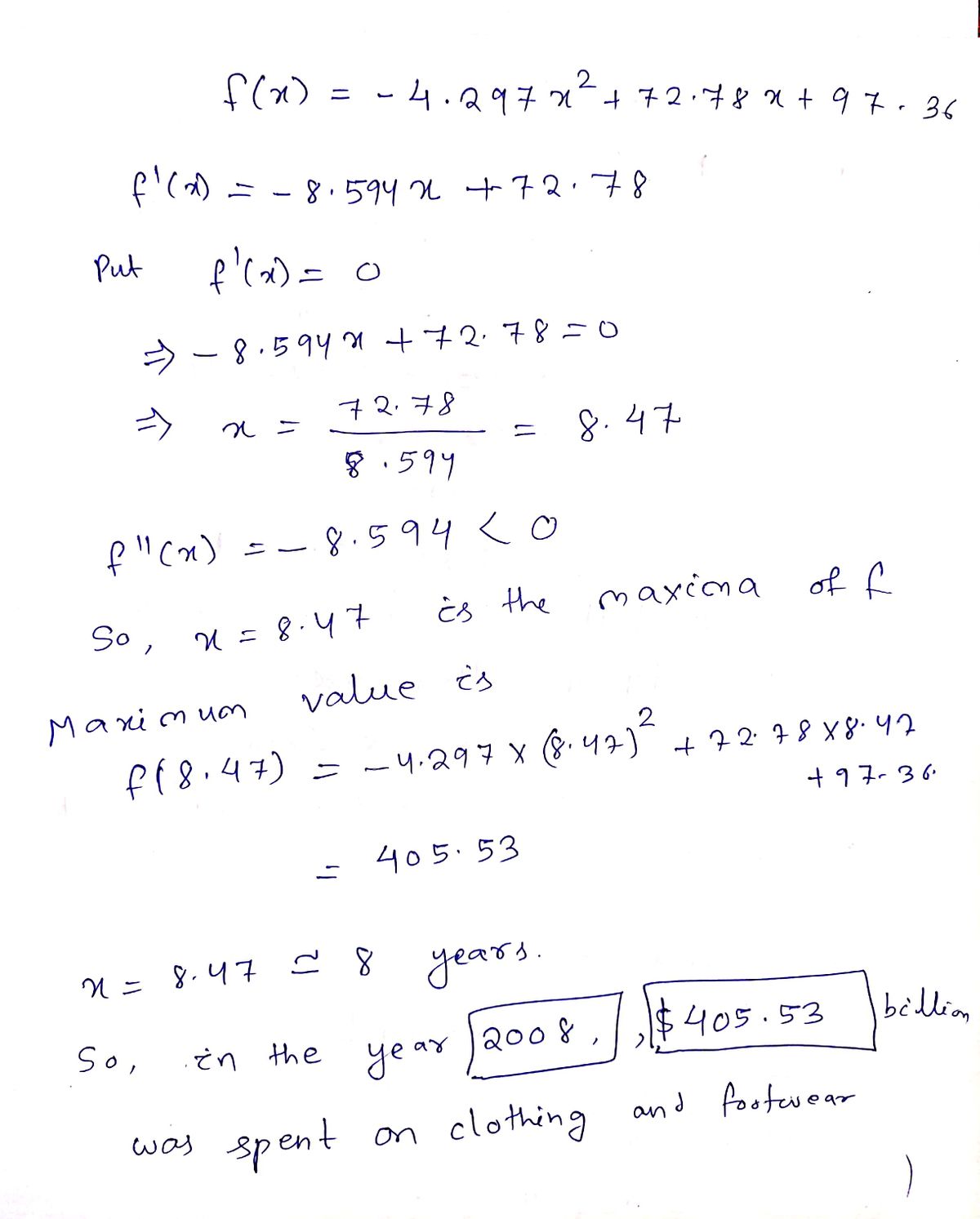The problem presents a mathematical model using the quadratic function \( f(x) = -4.297x^2 + 72.78x + 97.36 \), which represents the total amount spent by a certain number of people on clothing and footwear from 2000 to 2009. Here, \( x = 0 \) corresponds to January 1, 2000, \( x = 1 \) corresponds to January 1, 2001, and so on. The function \( f(x) \) gives the amount in billions of dollars. The question asks in which year during this period the amount spent was at its maximum, and it requests the final answer to be rounded to the nearest whole number, with intermediate calculations rounded to the nearest tenth. ### Instructions: - Determine the year when spending was at its highest by finding the vertex of the quadratic function. - Enter your calculated result in the provided fields and click "Check Answer." This problem involves applying knowledge of quadratic functions and maxima to interpret real-world spending data within a specified timeframe.
The problem presents a mathematical model using the quadratic function \( f(x) = -4.297x^2 + 72.78x + 97.36 \), which represents the total amount spent by a certain number of people on clothing and footwear from 2000 to 2009. Here, \( x = 0 \) corresponds to January 1, 2000, \( x = 1 \) corresponds to January 1, 2001, and so on. The function \( f(x) \) gives the amount in billions of dollars. The question asks in which year during this period the amount spent was at its maximum, and it requests the final answer to be rounded to the nearest whole number, with intermediate calculations rounded to the nearest tenth. ### Instructions: - Determine the year when spending was at its highest by finding the vertex of the quadratic function. - Enter your calculated result in the provided fields and click "Check Answer." This problem involves applying knowledge of quadratic functions and maxima to interpret real-world spending data within a specified timeframe.
Advanced Engineering Mathematics
10th Edition
ISBN:9780470458365
Author:Erwin Kreyszig
Publisher:Erwin Kreyszig
Chapter2: Second-order Linear Odes
Section: Chapter Questions
Problem 1RQ
Related questions
Question

Transcribed Image Text:The problem presents a mathematical model using the quadratic function \( f(x) = -4.297x^2 + 72.78x + 97.36 \), which represents the total amount spent by a certain number of people on clothing and footwear from 2000 to 2009. Here, \( x = 0 \) corresponds to January 1, 2000, \( x = 1 \) corresponds to January 1, 2001, and so on. The function \( f(x) \) gives the amount in billions of dollars.
The question asks in which year during this period the amount spent was at its maximum, and it requests the final answer to be rounded to the nearest whole number, with intermediate calculations rounded to the nearest tenth.
### Instructions:
- Determine the year when spending was at its highest by finding the vertex of the quadratic function.
- Enter your calculated result in the provided fields and click "Check Answer."
This problem involves applying knowledge of quadratic functions and maxima to interpret real-world spending data within a specified timeframe.
Expert Solution
Step 1

Step by step
Solved in 2 steps with 1 images

Recommended textbooks for you

Advanced Engineering Mathematics
Advanced Math
ISBN:
9780470458365
Author:
Erwin Kreyszig
Publisher:
Wiley, John & Sons, Incorporated

Numerical Methods for Engineers
Advanced Math
ISBN:
9780073397924
Author:
Steven C. Chapra Dr., Raymond P. Canale
Publisher:
McGraw-Hill Education

Introductory Mathematics for Engineering Applicat…
Advanced Math
ISBN:
9781118141809
Author:
Nathan Klingbeil
Publisher:
WILEY

Advanced Engineering Mathematics
Advanced Math
ISBN:
9780470458365
Author:
Erwin Kreyszig
Publisher:
Wiley, John & Sons, Incorporated

Numerical Methods for Engineers
Advanced Math
ISBN:
9780073397924
Author:
Steven C. Chapra Dr., Raymond P. Canale
Publisher:
McGraw-Hill Education

Introductory Mathematics for Engineering Applicat…
Advanced Math
ISBN:
9781118141809
Author:
Nathan Klingbeil
Publisher:
WILEY

Mathematics For Machine Technology
Advanced Math
ISBN:
9781337798310
Author:
Peterson, John.
Publisher:
Cengage Learning,

